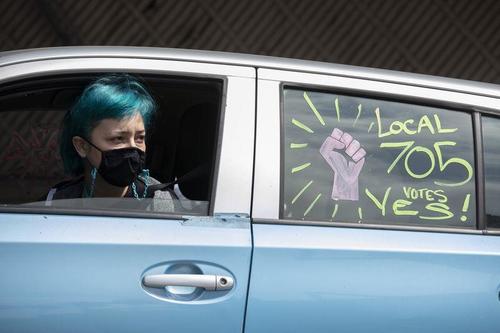Striking Workers Decry "Suicide Shifts" As Pandemic Burnout Takes Toll
As protesters across the United States voice their opposition to vaccine mandates and other pandemic restrictions, overworked employees - stretched to the brink of exhaustion, are also fighting for their sanity, according to Bloomberg.
From Hollywood sets to snack factories, and heavy-equipment makers to hospitals, employees are fighting back against what they see as a pernicious encroachment on their personal life -- with work restricting their ability to relax, or just to get a good night’s sleep.
Deere & Co. employees, who launched a 10,000-person strike Oct. 14, cited the mandatory overtime that can stretch their shifts to 12 hours. At Kellogg Co., the union went on strike this month after decrying the toll of seven-day workweeks that had kept cereal flowing to stuck-at-home customers during the pandemic. And at Frito-Lay Inc., workers have this year challenged what they called “suicide shifts”: being made to leave late and return early, with only eight hours of turnaround time in between.
At present, there are more than 100,000 workers who have recently advocated for work stoppages around the country - while a record 4.3 million people quit their jobs in August alone - putting more pressure on an already tight labor market.
According to Professor Joan Williams, director of the Center for WorkLife Law at the University of California's Hastings Law School, workers are reacting to paycheck insecurity and instability in their schedules.
"The issue of time as a workers’ rights issue has really come of age," Williams told Bloomberg. "Workers being sped up, deprived of weekends, deprived of sufficient rest time, with extremely unstable schedules and long and erratic work hours -- they’ve had enough."
Pandemic effect?
Early on in the Covid-19 pandemic, essential workers were championed as heroes (and now summarily fired if they don't take the most rushed vaccine in history). Yet, the accolades were largely lip service according to many of said workers, who say they didn't receive the enhanced pay or protections they feel they deserve.
Other workers, meanwhile, were largely able to work from home, spending time with their families while they 'reassessed' what they'd been sacrificing. Now, they're resisting long hours and undesirable working conditions.
"You’re only existing to do that job," said 49-year-old Hollywood cameraman Hassan Abdul-Wahid.
Several years ago, Abdul-Wahid arrived on a set and learned some horrifying news. A co-worker, driving home after an exhausting super-sized shift, dozed off, flipped her car and killed a friend. There wasn’t much time to reflect, Abdul-Wahid said. “We took a two-minute moment of silence and went back to work on some stupid music video.”
The Los Angeles Times and Wall Street Journal both reported on Friday, citing people familiar, that the movie set on which Alec Baldwin discharged a prop firearm that killed a person was plagued by complaints over pay and conditions, leading some workers to walk off. The movie’s production company, Rust Movie Productions LLC, called safety its top priority. -Bloomberg
Meanwhile over at Amazon - apparently due to a host of errors within the company's HR system - errors caused by underinvestment, according to company insiders - some Amazon workers have been routinely underpaid, and some have also been fired by what appears to be a mostly automated system mistakenly marked them as "no shows".
What happens when an entire class of workers reach their breaking point and there's nobody to replace them?
https://ift.tt/3Bd1JYn
from ZeroHedge News https://ift.tt/3Bd1JYn
via IFTTT


0 comments
Post a Comment